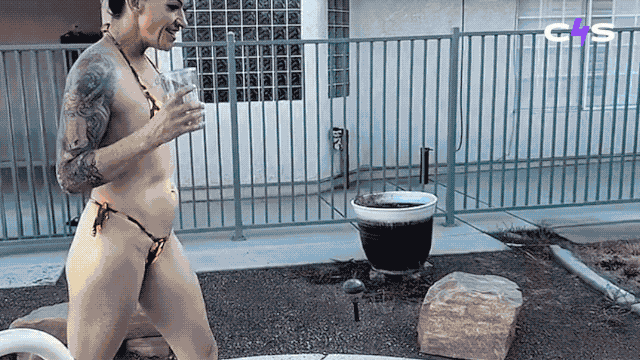In the days that followed, Dr. Morgan found herself haunted by the images Alan had shown her. The women in the videos—their closeness, the struggle, the strange beauty of strength and vulnerability intertwined—replayed behind her eyes whenever she tried to focus on her work. She found herself distracted in sessions with other patients, her thoughts slipping back to that evening and to the flicker of emotion she had felt while watching.
Disturbed by her own reactions, she decided to reach out to someone she trusted: Dr. Elise Turner, a fellow therapist she had known since residency. Elise was in her mid-forties as well, with the same professional calm and physical presence—a woman of similar build and height, someone who carried quiet authority and understanding.
They met in Elise’s office late on a Wednesday afternoon. Dr. Morgan sat on the patient’s couch this time, her fingers knotting together as she confessed the source of her turmoil.
“Elise, I’ve had a patient who came to me about a very unusual fixation,” she began, her voice low. “It’s not dangerous or violent, exactly, but it’s… intimate in ways I didn’t expect. And when he showed me what he meant, it—” she hesitated, exhaling sharply. “It did something to me.”
Elise studied her quietly from across the desk, chin resting on her hand. After a moment she asked, “Before we go any further—what exactly was his fetish, Morgan? What did he tell you?”
Dr. Morgan hesitated, struggling to find the right words. “It’s… difficult to explain without sounding crass. He said he only feels excitement when watching women wrestle—really fight. Not professionally, but in an intimate, personal way. He described it as something primal, like a contest of dominance and surrender.” She paused, glancing down at her clasped hands. “When he showed me a video, I saw what he meant. The closeness, the struggle—it wasn’t about violence, it was about connection. That’s what unsettled me.”
Elise leaned in slightly, her tone analytical but curious. “So, what stirred you wasn’t the fight itself, but the emotional current under it—the intensity, the power exchange.”
Dr. Morgan nodded, her voice small. “Yes. It was human in a way I hadn’t expected.”
Elise’s lips pressed into a thoughtful line. “Now, when you watched it… what did you feel first? Curiosity? Shock? Or something else?”
Dr. Morgan swallowed. “At first, shock. Then curiosity. Then… something warmer.”
Elise raised an eyebrow, not unkindly. “Arousal.”
The word hung in the air between them. Dr. Morgan gave a slow, reluctant nod, cheeks coloring.
Elise’s expression softened, but her eyes held a glint of intrigue. She wasn’t merely being kind; she was genuinely fascinated. “You’re human, Morgan. We all have unconscious triggers, things that awaken parts of ourselves we didn’t know existed. What you’re describing—this fascination with power, control, and surrender—it’s rich psychological territory.” She leaned forward a little, voice quiet but alive with curiosity. “You said it was like watching a dance, didn’t you? A contest that becomes something intimate. That’s not so far from many forms of human connection. Perhaps it only surprises you because it’s outside the frame we’re taught to see as normal.”
Elise paused, studying her colleague closely. “To be honest, the way you describe it… I can almost see it myself. Two people, testing limits, discovering something honest in the struggle.” Her smile was faint, but her voice carried an undercurrent of recognition. “It makes sense that it stayed with you.”
The bluntness made Dr. Morgan look away, cheeks warming. “Yes,” she admitted. “And that scares me. I’m not supposed to react that way. It wasn’t intentional, but I can’t stop thinking about it.”
Elise nodded slowly, her tone measured. “You’re human, Morgan. We all have unconscious triggers, things that awaken parts of ourselves we didn’t know existed. The important thing is recognizing them—not suppressing them.”
“I keep telling myself that,” Dr. Morgan murmured. “But I can’t shake the feeling that I crossed a line. That somehow, just by being curious, I stepped outside the boundaries of professionalism.”
Elise leaned back, thoughtful. “Curiosity isn’t a crime. You didn’t act on it—you observed. And maybe what’s bothering you is that you saw a reflection of something inside yourself. Something that’s been dormant.”
Dr. Morgan looked up, surprised by the accuracy of the remark. “That’s exactly it. I’ve never thought of myself as someone drawn to that kind of intensity, that kind of power struggle. But now…” She trailed off, shaking her head.
Elise’s expression softened. “Sometimes the things that unsettle us most are the ones that teach us who we really are. Maybe this isn’t about him at all. Maybe it’s about you.”
For a long moment, Dr. Morgan didn’t respond. Then she whispered, almost to herself, “That’s what I’m afraid of.”
Elise smiled gently. “Don’t be. Just pay attention. The mind doesn’t wake up new desires without a reason.”
As Dr. Morgan left the office that evening, dusk settling outside, she felt both lighter and more unsettled than before. Elise’s words followed her into the quiet of her car: Maybe this isn’t about him at all.
But before Dr. Morgan left Elise’s office, her colleague had leaned forward once more, speaking in a tone that mixed professionalism with genuine curiosity. “Morgan, if this is stirring something in you, maybe you should explore it in a controlled way. Think of it as observation, but with awareness. Take notes on your own reactions—what images come back, what emotions accompany them. That kind of reflection can be deeply revealing.”
Dr. Morgan frowned slightly. “You mean, like a self-study?”
Elise nodded. “Exactly. You can’t analyze what you refuse to acknowledge. Observe yourself the way you’d observe a patient. Notice what happens when you picture the struggle, the closeness. Write it down. Sketch it, even. See what it evokes.”
Morgan hesitated, but Elise’s tone was calm, reassuring. “There’s nothing wrong with curiosity. This isn’t indulgence—it’s awareness. The mind sometimes leads us where we need to go before we understand why.”
Dr. Morgan smiled faintly, uncertain. “You really think it’s safe to do that?”
Elise’s gaze was steady. “Safer than ignoring it.”
Those words stayed with her too, echoing in the car as she sat behind the wheel, the glow of streetlights painting soft halos across the windshield. For the first time, she considered what it might mean to turn her own curiosity inward—to confront not just Alan’s desires, but her own.
Once Dr. Morgan left, Elise remained seated in her chair, her fingers steepled beneath her chin. The office felt quieter than usual, the muted tick of the wall clock suddenly intrusive. She replayed the conversation in her mind—the flicker in Morgan’s eyes, the tremor in her voice when she described the scenes Alan had shown her. Elise had seen hundreds of colleagues unravel under stress or personal bias, but there had been something different in this exchange. Something that lingered.
She rose slowly, walked to the window, and stared out at the dim streetlights below. The idea of the videos, of the struggle that Morgan had described, pressed against her thoughts like a shadow she couldn’t quite shake. A contest that becomes something intimate, she recalled Morgan saying. Elise’s pulse quickened as she realized she could almost picture it herself—the clash of strength, the blurring of boundaries between dominance and connection.
It wasn’t judgment that she felt, but fascination. Curiosity had taken root in her, too. For years, she had listened to other people’s confessions without ever feeling personally stirred by them. Yet now she wondered what had drawn Morgan so deeply, what made that kind of encounter awaken something in her. She found herself questioning what she might feel if she saw it for herself.
Elise exhaled slowly, unsettled by the direction of her own thoughts. She told herself it was empathy, professional identification—but even as she turned off the lamp and gathered her bag, she knew the line between curiosity and desire had begun to blur, however faintly. And like Morgan, she couldn’t help but think: maybe this wasn’t about her colleague at all.



